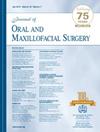选择性血清素再摄取抑制剂可能增加种植体失败。
IF 2.3
3区 医学
Q2 DENTISTRY, ORAL SURGERY & MEDICINE
引用次数: 0
摘要
背景:接受种植牙的患者可以服用选择性血清素再摄取抑制剂(SSRI)。在种植体放置和种植体失败时服用SSRI可能有关联。目的:本研究的目的是评估SSIR暴露与种植体失败之间的关系。研究设计:研究设计为回顾性队列研究。样本是2007年12月1日至2020年2月29日期间接受植牙的患者。预测变量:预测变量为植入物放置时SSRI暴露,编码为暴露或未暴露。结果变量:主要结果变量是1年时种植体状态,编码为存活或失败。协变量:协变量包括年龄、性别、植入位置和每个受试者,合并症包括吸烟、糖尿病、骨质疏松症和虚弱。分析:双变量统计评估植入时SSRI暴露与失败之间的关联,P值< 0.05。结果:共1611例(平均年龄57.3±15.8岁),女性893例(55.4%),种植体3184个。1514例(94%)受试者在植入时未服用SSRI(平均年龄57.5±15.5岁,女性813例(53.7%)),97例(6%)受试者在植入时服用SSRI(平均年龄61.6±13.1岁,女性80例(82.5%))。非SSRI暴露组的失败率为6.7%(101例),植入时服用SSRI的失败率为18.6%(18例)。SSRI暴露与植入物失败相关,1年相对风险= 2.8;1.8-4.4(相对风险,95%置信区间)。与植入失败相关的协变量:吸烟优势比(OR) = 0.98, 1.5-5.5 (OR, 95%置信限,P)结论:在植入手术时服用SSRI的患者可能增加植入失败的风险。本文章由计算机程序翻译,如有差异,请以英文原文为准。
Selective Serotonin Reuptake Inhibitors May Increase Implant Failure
Background
Patients receiving dental implants may take selective serotonin reuptake inhibitors (SSRI). There may be an association with taking an SSRI at implant placement and implant failure.
Purpose
The study's purpose was to estimate the association between SSIR exposure and implant failure.
Study design
The study design was a retrospective cohort study. The sample was patients who received dental implants between December 1, 2007, and February 29, 2020. Patients were excluded if the follow-up was <12 months.
Predictor variable
The predictor variable was SSRI exposure at the time of implant placement coded as exposed or not exposed.
Outcome variable
The primary outcome variable was implant status at 1 year, coded as survived or failed.
Covariates
The covariates were age, sex, and implant location and per subject, and comorbidities included smoking, diabetes, osteoporosis, and frailty.
Analyses
Bivariate statistics assessed the association between SSRI exposure at the time of implant placement and failure with significance at P value < .05.
Results
The sample was composed of 1,611 subjects (mean age 57.3 ± 15.8 years, 893 (55.4%) females) with 3,184 implants placed. There were 1,514 (94%) subjects who did not take an SSRI at implant placement (mean age 57.5 ± 15.5 years, 813 (53.7%) females) and there were 97 (6%) subjects who did take an SSRI at implant placement (mean age 61.6 ± 13.1 years, 80 (82.5%) females). The failure rate was 6.7% (101 subjects) for non-SSRI exposed subjects and 18.6% (18 subjects) who took an SSRI at implant placement. SSRI exposure was associated with implant failure at 1-year relative risk = 2.8; 1.8-4.4 (relative risk, 95% confidence interval). Covariates with association with failure: smoking odds ratio (OR) = 0.98, 1.5-5.5 (OR, 95% confidence limits, P < .0001), diabetes (OR = 1.8, 95% confidence interval [CI], P = .048), alcohol (OR = 1.9, 95% CI, P = .045), osteoporosis (OR = 14.1, 95% CI, P < .0001), debilitation (OR = 20.7, 95% CI, P < .0001), and bisphosphonates (OR = 0.09, 95% CI, P = .004).
Conclusions
Patients who take SSRI at the time of implant surgery may have an increased risk for implant failure.
求助全文
通过发布文献求助,成功后即可免费获取论文全文。
去求助
来源期刊

Journal of Oral and Maxillofacial Surgery
医学-牙科与口腔外科
CiteScore
4.00
自引率
5.30%
发文量
0
审稿时长
41 days
期刊介绍:
This monthly journal offers comprehensive coverage of new techniques, important developments and innovative ideas in oral and maxillofacial surgery. Practice-applicable articles help develop the methods used to handle dentoalveolar surgery, facial injuries and deformities, TMJ disorders, oral cancer, jaw reconstruction, anesthesia and analgesia. The journal also includes specifics on new instruments and diagnostic equipment and modern therapeutic drugs and devices. Journal of Oral and Maxillofacial Surgery is recommended for first or priority subscription by the Dental Section of the Medical Library Association.
 求助内容:
求助内容: 应助结果提醒方式:
应助结果提醒方式:


